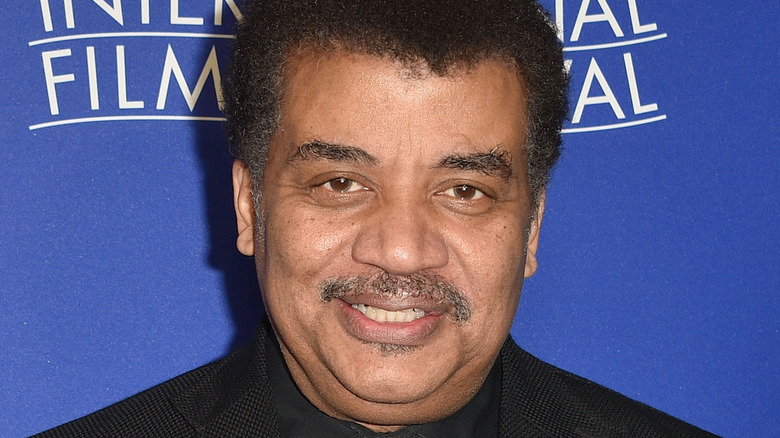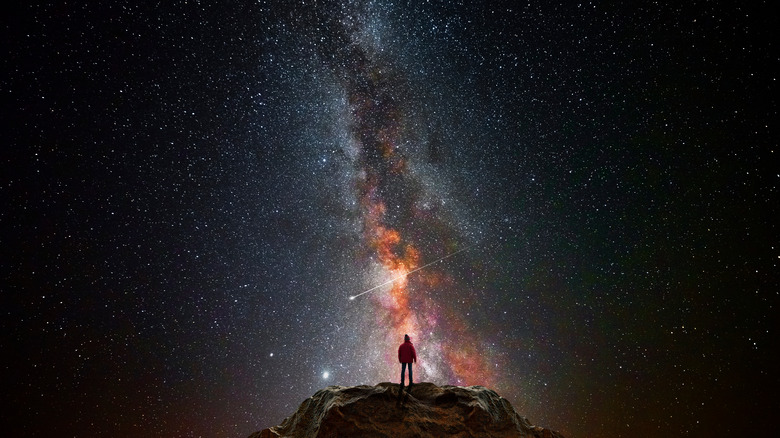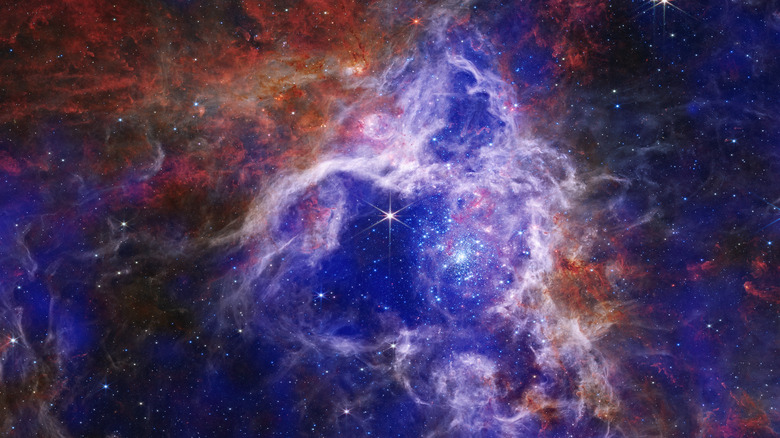The Scary Way Neil DeGrasse Tyson Thinks The Universe Will End
Neil deGrasse Tyson: the man, the mind, the masterful maestro of manifold astrophysical rejoinders. In other words: if you've got a question about the cosmos — also the name of Tyson's rebooted Carl Sagan series, "Cosmos" — then you can be sure Tyson's got an answer. Hop on over to Tyson's StarTalk YouTube channel and you'll come across a whole host of fascinating and/or dumbfounding topics to chew on: time dilation, the nature of wormholes, the shape of the universe, dark matter, the mechanics of oceanic tides, and even the ethics of driverless cars. As the current director of the Hayden Planetarium at the American Museum of Natural History, few people are as qualified to comment on universal, supermassive questions than Tyson.
So if Tyson starts talking about horrifying, cosmos-annihilating scenarios with terrifying titles like "The Big Rip," as he did on "The Late Show with Stephen Colbert" in March, 2021 (watchable on YouTube), there's cause for concern. The Big Rip hinges on the continued expansion of the universe, which in case you didn't know is a thing that's happening. And as Space.com explains, not only is the universe expanding, but it's expanding at a rate faster than the speed of light. This means that most of the universe will be forever out of reach unless we can somehow bypass the light-speed barrier. Some unknown phenomenon dubbed "dark energy" is fueling the universe's expansion. And if dark energy wins the battle against the phenomena holding the universe together — gravity and dark matter — then the whole universe might shred itself apart at the sub-atomic level.
Atomically shredded in the Big Rip
First off, you don't have to worry about this whole universe-obliterating Big Rip thing for quite some time — the cosmos will not be big-ripped apart sometime next Tuesday, or even the Tuesday after that. So take a deep breath, keep your appointments, and exit your apocalypse bunker. As Wired says, if the Big Rip does happen, it'll happen in about 22 billion years. Long before that far-flung 22 billion years in the future, however, the sun will expand into a red giant and consume Earth (per Astronomy), our Milky Way Galaxy will fuse with the Andromeda Galaxy (per EarthSky), and humanity will likely be long-dead — just to keep things in perspective. But for those readers banking on an immortal soul, or who are looking forward to the old consciousness-in-a-box mind upload, well ... sorry.
As the esteemed Neil deGrasse Tyson explains in his interview with Stephen Colbert (watchable on YouTube), space itself is expanding. Galaxies themselves are stuck together, so they stay whole even as the space around them expands. In the same way, individual objects — stars, planets, you, your latte — remain stuck together as well. But eventually, the forces fueling the expansion of the universe may overcome the molecular, even atomic, and then sub-atomic forces binding the very fabric of spacetime together. If that happens then space itself, down to every single errant quantum particle, will separate into an infinitesimal nothing.
Alternative cosmic deaths
As sites like The Conversation discuss, the Big Rip isn't a new idea. We know that space itself isn't actually empty; the vacuum of space is permeated with energetic quantum fields. And as space expands, it fills with more of this "energy of space," so to speak, which fuels the universe's expansion more and more. In the early 20th century Albert Einstein, in an attempt to explain why gravitational forces didn't just clump all matter together, described a repulsive property within the universe called the "cosmological constant." Modern researchers equate this constant with the dark energy that would drive the Big Rip, per Live Science.
But have no fear. Neil deGrasse Tyson and others state that the Big Rip isn't the only way the universe could end. As Tyson mentions briefly in his interview with Stephen Colbert (watchable on YouTube), we've also got the Heat Death of the Universe. In the unimaginably far future, at a time of maximum cosmic entropy (disorder) when all stellar bodies and even all black holes have dissipated, the universe might be a bland, drab slab of uniform heat and energy where no distinct objects can ever exist, ever again, as Big Think overviews. Fun times. One other option largely discarded by researchers is the Big Crunch, where the gravitational forces of the universe overcome the expansive forces and everything collapses back into a pre-Big Bang-like singularity, per Universe Today. In light of such options, maybe the Big Rip isn't so bad.


